Arden University BUS5001 Report: Cross-Cultural Management Analysis
VerifiedAdded on 2023/01/12
|16
|5268
|50
Report
AI Summary
This report provides a comprehensive analysis of cross-cultural management, essential for businesses operating in a globalized world. It begins by introducing the concept of globalization and its impact on businesses, followed by an exploration of key cultural theories, including Hofstede's and Trompenaars' models. These theories offer frameworks for understanding and navigating cultural differences in the workplace. The report then delves into the dynamics of global virtual teams, discussing their advantages and disadvantages, and strategies for effective management, including communication and team building. Furthermore, the report examines critical international management skills, such as communication, leadership, decision-making, and negotiation, highlighting how these skills must be adapted to different cultural contexts. Finally, it offers practical recommendations for managing cross-cultural teams and concludes with a summary of the key findings and their implications for business success.

Managing cross cultures
Paraphrase This Document
Need a fresh take? Get an instant paraphrase of this document with our AI Paraphraser
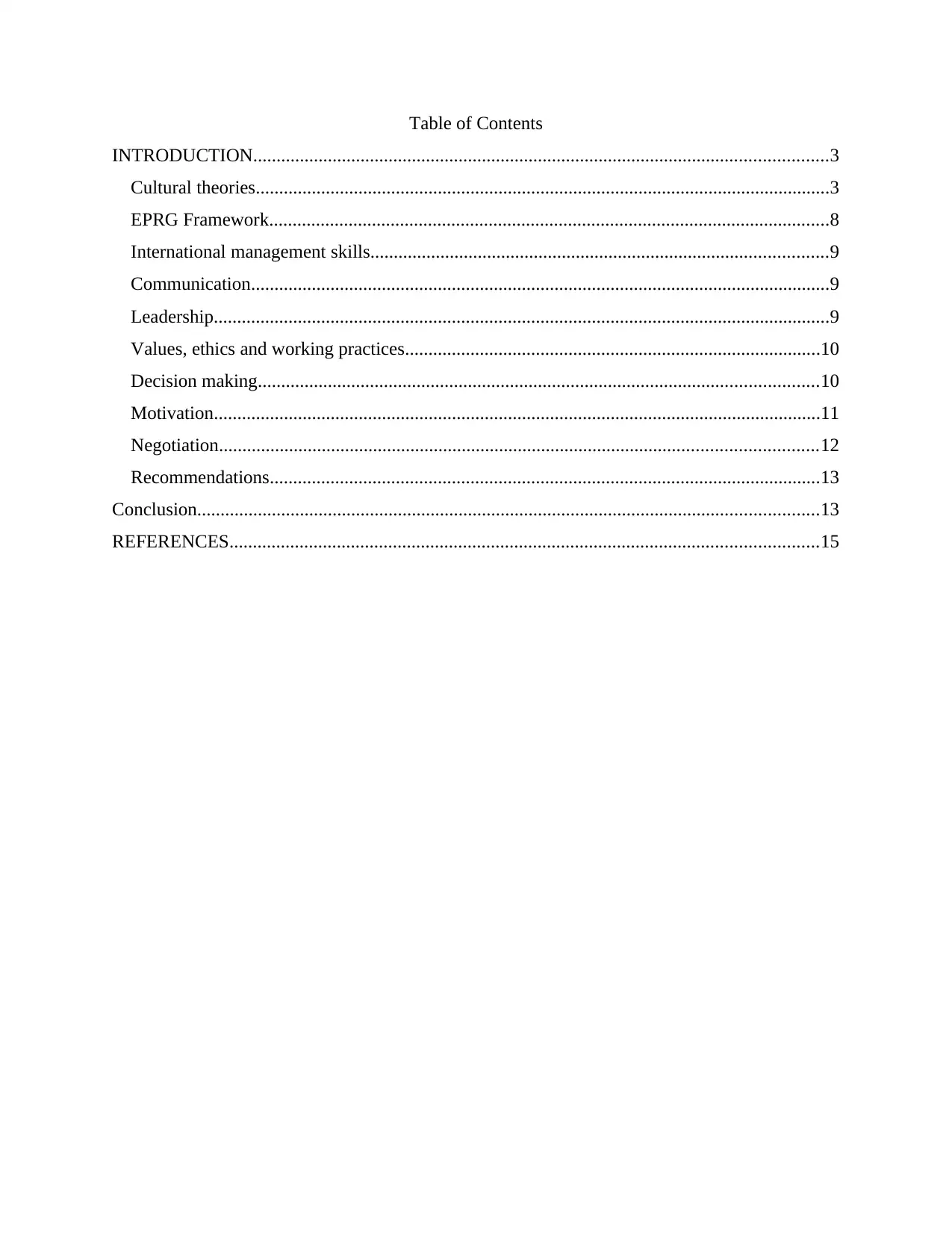
Table of Contents
INTRODUCTION...........................................................................................................................3
Cultural theories...........................................................................................................................3
EPRG Framework........................................................................................................................8
International management skills..................................................................................................9
Communication............................................................................................................................9
Leadership....................................................................................................................................9
Values, ethics and working practices.........................................................................................10
Decision making........................................................................................................................10
Motivation..................................................................................................................................11
Negotiation................................................................................................................................12
Recommendations......................................................................................................................13
Conclusion.....................................................................................................................................13
REFERENCES..............................................................................................................................15
INTRODUCTION...........................................................................................................................3
Cultural theories...........................................................................................................................3
EPRG Framework........................................................................................................................8
International management skills..................................................................................................9
Communication............................................................................................................................9
Leadership....................................................................................................................................9
Values, ethics and working practices.........................................................................................10
Decision making........................................................................................................................10
Motivation..................................................................................................................................11
Negotiation................................................................................................................................12
Recommendations......................................................................................................................13
Conclusion.....................................................................................................................................13
REFERENCES..............................................................................................................................15
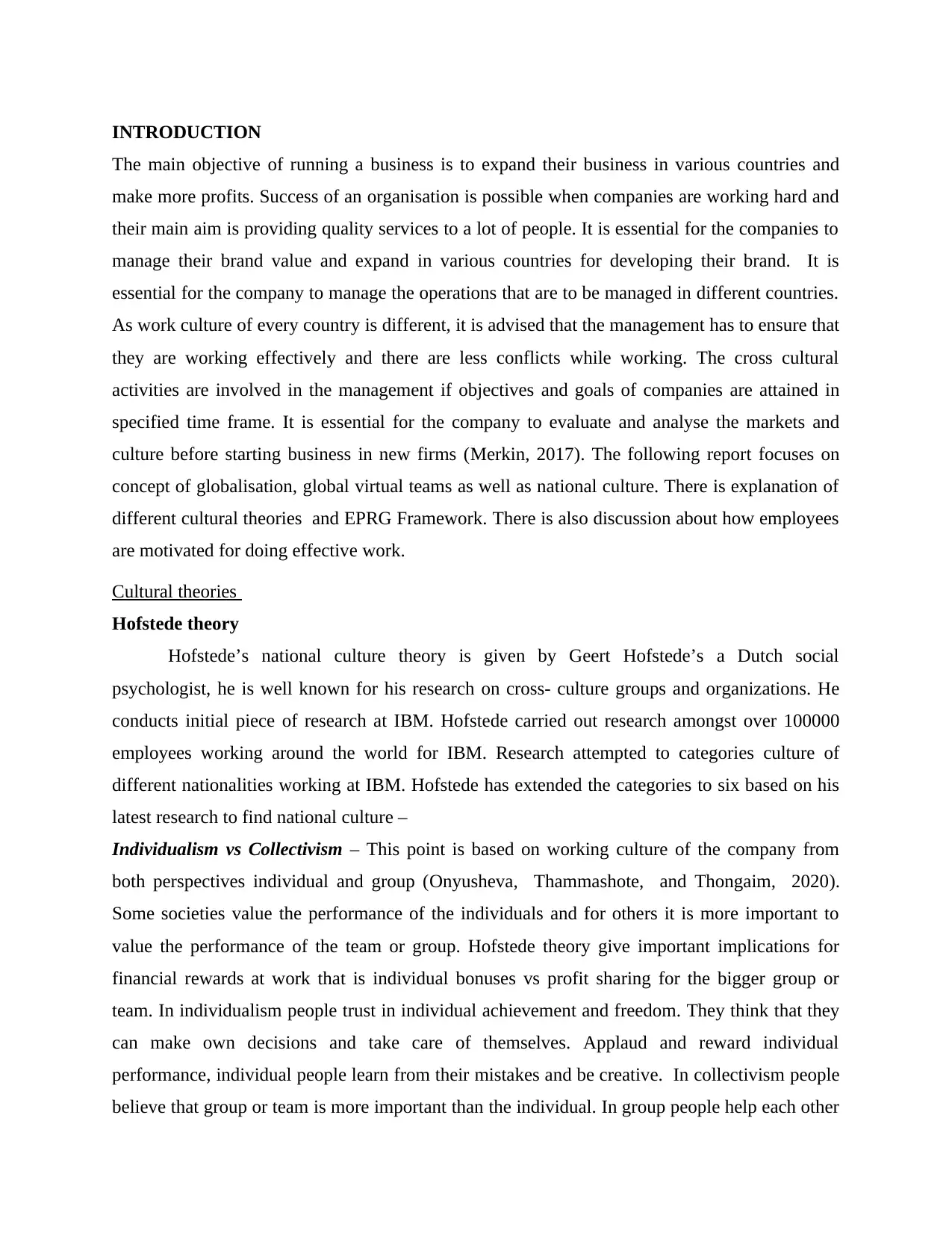
INTRODUCTION
The main objective of running a business is to expand their business in various countries and
make more profits. Success of an organisation is possible when companies are working hard and
their main aim is providing quality services to a lot of people. It is essential for the companies to
manage their brand value and expand in various countries for developing their brand. It is
essential for the company to manage the operations that are to be managed in different countries.
As work culture of every country is different, it is advised that the management has to ensure that
they are working effectively and there are less conflicts while working. The cross cultural
activities are involved in the management if objectives and goals of companies are attained in
specified time frame. It is essential for the company to evaluate and analyse the markets and
culture before starting business in new firms (Merkin, 2017). The following report focuses on
concept of globalisation, global virtual teams as well as national culture. There is explanation of
different cultural theories and EPRG Framework. There is also discussion about how employees
are motivated for doing effective work.
Cultural theories
Hofstede theory
Hofstede’s national culture theory is given by Geert Hofstede’s a Dutch social
psychologist, he is well known for his research on cross- culture groups and organizations. He
conducts initial piece of research at IBM. Hofstede carried out research amongst over 100000
employees working around the world for IBM. Research attempted to categories culture of
different nationalities working at IBM. Hofstede has extended the categories to six based on his
latest research to find national culture –
Individualism vs Collectivism – This point is based on working culture of the company from
both perspectives individual and group (Onyusheva, Thammashote, and Thongaim, 2020).
Some societies value the performance of the individuals and for others it is more important to
value the performance of the team or group. Hofstede theory give important implications for
financial rewards at work that is individual bonuses vs profit sharing for the bigger group or
team. In individualism people trust in individual achievement and freedom. They think that they
can make own decisions and take care of themselves. Applaud and reward individual
performance, individual people learn from their mistakes and be creative. In collectivism people
believe that group or team is more important than the individual. In group people help each other
The main objective of running a business is to expand their business in various countries and
make more profits. Success of an organisation is possible when companies are working hard and
their main aim is providing quality services to a lot of people. It is essential for the companies to
manage their brand value and expand in various countries for developing their brand. It is
essential for the company to manage the operations that are to be managed in different countries.
As work culture of every country is different, it is advised that the management has to ensure that
they are working effectively and there are less conflicts while working. The cross cultural
activities are involved in the management if objectives and goals of companies are attained in
specified time frame. It is essential for the company to evaluate and analyse the markets and
culture before starting business in new firms (Merkin, 2017). The following report focuses on
concept of globalisation, global virtual teams as well as national culture. There is explanation of
different cultural theories and EPRG Framework. There is also discussion about how employees
are motivated for doing effective work.
Cultural theories
Hofstede theory
Hofstede’s national culture theory is given by Geert Hofstede’s a Dutch social
psychologist, he is well known for his research on cross- culture groups and organizations. He
conducts initial piece of research at IBM. Hofstede carried out research amongst over 100000
employees working around the world for IBM. Research attempted to categories culture of
different nationalities working at IBM. Hofstede has extended the categories to six based on his
latest research to find national culture –
Individualism vs Collectivism – This point is based on working culture of the company from
both perspectives individual and group (Onyusheva, Thammashote, and Thongaim, 2020).
Some societies value the performance of the individuals and for others it is more important to
value the performance of the team or group. Hofstede theory give important implications for
financial rewards at work that is individual bonuses vs profit sharing for the bigger group or
team. In individualism people trust in individual achievement and freedom. They think that they
can make own decisions and take care of themselves. Applaud and reward individual
performance, individual people learn from their mistakes and be creative. In collectivism people
believe that group or team is more important than the individual. In group people help each other
⊘ This is a preview!⊘
Do you want full access?
Subscribe today to unlock all pages.

Trusted by 1+ million students worldwide
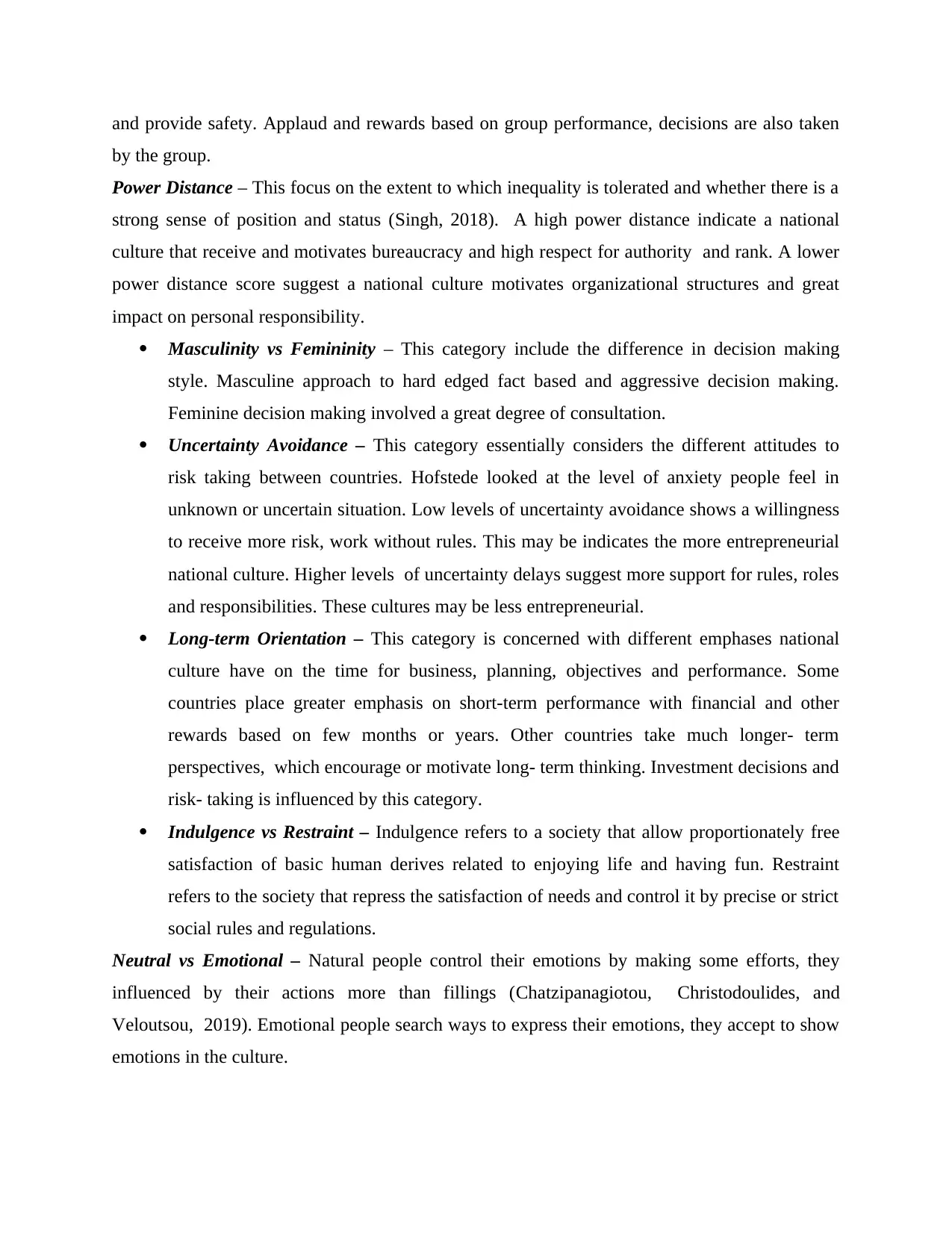
and provide safety. Applaud and rewards based on group performance, decisions are also taken
by the group.
Power Distance – This focus on the extent to which inequality is tolerated and whether there is a
strong sense of position and status (Singh, 2018). A high power distance indicate a national
culture that receive and motivates bureaucracy and high respect for authority and rank. A lower
power distance score suggest a national culture motivates organizational structures and great
impact on personal responsibility.
Masculinity vs Femininity – This category include the difference in decision making
style. Masculine approach to hard edged fact based and aggressive decision making.
Feminine decision making involved a great degree of consultation.
Uncertainty Avoidance – This category essentially considers the different attitudes to
risk taking between countries. Hofstede looked at the level of anxiety people feel in
unknown or uncertain situation. Low levels of uncertainty avoidance shows a willingness
to receive more risk, work without rules. This may be indicates the more entrepreneurial
national culture. Higher levels of uncertainty delays suggest more support for rules, roles
and responsibilities. These cultures may be less entrepreneurial.
Long-term Orientation – This category is concerned with different emphases national
culture have on the time for business, planning, objectives and performance. Some
countries place greater emphasis on short-term performance with financial and other
rewards based on few months or years. Other countries take much longer- term
perspectives, which encourage or motivate long- term thinking. Investment decisions and
risk- taking is influenced by this category.
Indulgence vs Restraint – Indulgence refers to a society that allow proportionately free
satisfaction of basic human derives related to enjoying life and having fun. Restraint
refers to the society that repress the satisfaction of needs and control it by precise or strict
social rules and regulations.
Neutral vs Emotional – Natural people control their emotions by making some efforts, they
influenced by their actions more than fillings (Chatzipanagiotou, Christodoulides, and
Veloutsou, 2019). Emotional people search ways to express their emotions, they accept to show
emotions in the culture.
by the group.
Power Distance – This focus on the extent to which inequality is tolerated and whether there is a
strong sense of position and status (Singh, 2018). A high power distance indicate a national
culture that receive and motivates bureaucracy and high respect for authority and rank. A lower
power distance score suggest a national culture motivates organizational structures and great
impact on personal responsibility.
Masculinity vs Femininity – This category include the difference in decision making
style. Masculine approach to hard edged fact based and aggressive decision making.
Feminine decision making involved a great degree of consultation.
Uncertainty Avoidance – This category essentially considers the different attitudes to
risk taking between countries. Hofstede looked at the level of anxiety people feel in
unknown or uncertain situation. Low levels of uncertainty avoidance shows a willingness
to receive more risk, work without rules. This may be indicates the more entrepreneurial
national culture. Higher levels of uncertainty delays suggest more support for rules, roles
and responsibilities. These cultures may be less entrepreneurial.
Long-term Orientation – This category is concerned with different emphases national
culture have on the time for business, planning, objectives and performance. Some
countries place greater emphasis on short-term performance with financial and other
rewards based on few months or years. Other countries take much longer- term
perspectives, which encourage or motivate long- term thinking. Investment decisions and
risk- taking is influenced by this category.
Indulgence vs Restraint – Indulgence refers to a society that allow proportionately free
satisfaction of basic human derives related to enjoying life and having fun. Restraint
refers to the society that repress the satisfaction of needs and control it by precise or strict
social rules and regulations.
Neutral vs Emotional – Natural people control their emotions by making some efforts, they
influenced by their actions more than fillings (Chatzipanagiotou, Christodoulides, and
Veloutsou, 2019). Emotional people search ways to express their emotions, they accept to show
emotions in the culture.
Paraphrase This Document
Need a fresh take? Get an instant paraphrase of this document with our AI Paraphraser
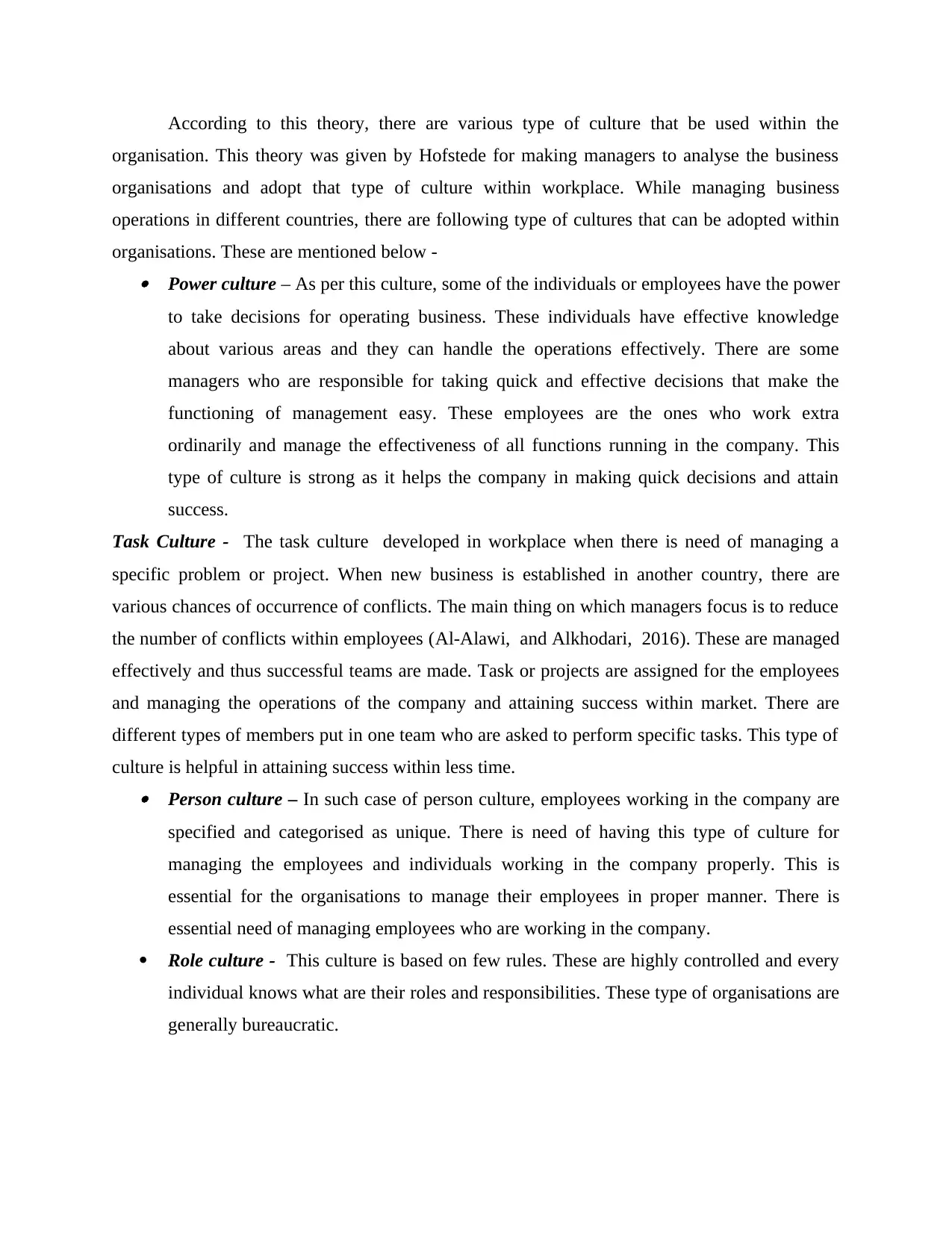
According to this theory, there are various type of culture that be used within the
organisation. This theory was given by Hofstede for making managers to analyse the business
organisations and adopt that type of culture within workplace. While managing business
operations in different countries, there are following type of cultures that can be adopted within
organisations. These are mentioned below - Power culture – As per this culture, some of the individuals or employees have the power
to take decisions for operating business. These individuals have effective knowledge
about various areas and they can handle the operations effectively. There are some
managers who are responsible for taking quick and effective decisions that make the
functioning of management easy. These employees are the ones who work extra
ordinarily and manage the effectiveness of all functions running in the company. This
type of culture is strong as it helps the company in making quick decisions and attain
success.
Task Culture - The task culture developed in workplace when there is need of managing a
specific problem or project. When new business is established in another country, there are
various chances of occurrence of conflicts. The main thing on which managers focus is to reduce
the number of conflicts within employees (Al-Alawi, and Alkhodari, 2016). These are managed
effectively and thus successful teams are made. Task or projects are assigned for the employees
and managing the operations of the company and attaining success within market. There are
different types of members put in one team who are asked to perform specific tasks. This type of
culture is helpful in attaining success within less time. Person culture – In such case of person culture, employees working in the company are
specified and categorised as unique. There is need of having this type of culture for
managing the employees and individuals working in the company properly. This is
essential for the organisations to manage their employees in proper manner. There is
essential need of managing employees who are working in the company.
Role culture - This culture is based on few rules. These are highly controlled and every
individual knows what are their roles and responsibilities. These type of organisations are
generally bureaucratic.
organisation. This theory was given by Hofstede for making managers to analyse the business
organisations and adopt that type of culture within workplace. While managing business
operations in different countries, there are following type of cultures that can be adopted within
organisations. These are mentioned below - Power culture – As per this culture, some of the individuals or employees have the power
to take decisions for operating business. These individuals have effective knowledge
about various areas and they can handle the operations effectively. There are some
managers who are responsible for taking quick and effective decisions that make the
functioning of management easy. These employees are the ones who work extra
ordinarily and manage the effectiveness of all functions running in the company. This
type of culture is strong as it helps the company in making quick decisions and attain
success.
Task Culture - The task culture developed in workplace when there is need of managing a
specific problem or project. When new business is established in another country, there are
various chances of occurrence of conflicts. The main thing on which managers focus is to reduce
the number of conflicts within employees (Al-Alawi, and Alkhodari, 2016). These are managed
effectively and thus successful teams are made. Task or projects are assigned for the employees
and managing the operations of the company and attaining success within market. There are
different types of members put in one team who are asked to perform specific tasks. This type of
culture is helpful in attaining success within less time. Person culture – In such case of person culture, employees working in the company are
specified and categorised as unique. There is need of having this type of culture for
managing the employees and individuals working in the company properly. This is
essential for the organisations to manage their employees in proper manner. There is
essential need of managing employees who are working in the company.
Role culture - This culture is based on few rules. These are highly controlled and every
individual knows what are their roles and responsibilities. These type of organisations are
generally bureaucratic.
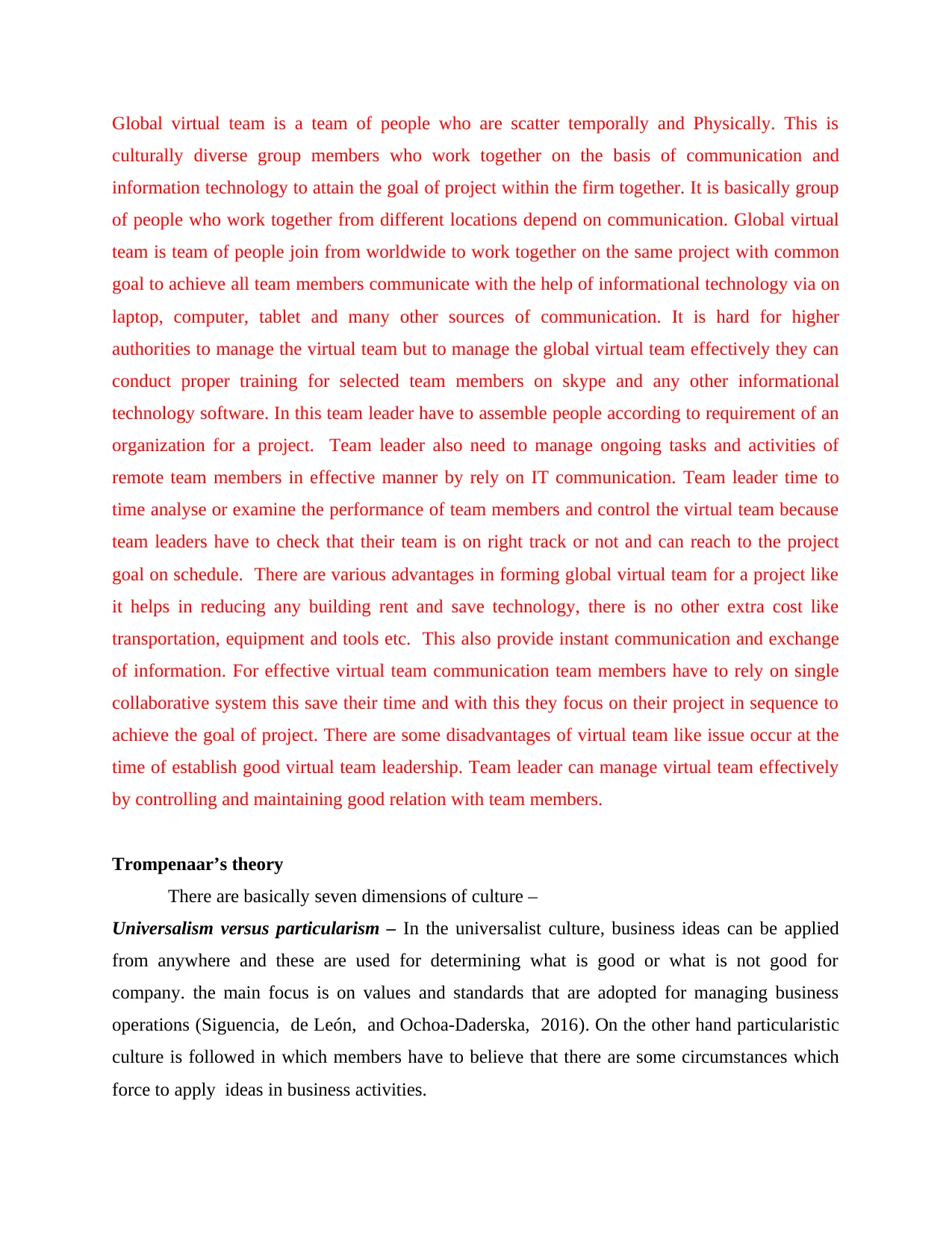
Global virtual team is a team of people who are scatter temporally and Physically. This is
culturally diverse group members who work together on the basis of communication and
information technology to attain the goal of project within the firm together. It is basically group
of people who work together from different locations depend on communication. Global virtual
team is team of people join from worldwide to work together on the same project with common
goal to achieve all team members communicate with the help of informational technology via on
laptop, computer, tablet and many other sources of communication. It is hard for higher
authorities to manage the virtual team but to manage the global virtual team effectively they can
conduct proper training for selected team members on skype and any other informational
technology software. In this team leader have to assemble people according to requirement of an
organization for a project. Team leader also need to manage ongoing tasks and activities of
remote team members in effective manner by rely on IT communication. Team leader time to
time analyse or examine the performance of team members and control the virtual team because
team leaders have to check that their team is on right track or not and can reach to the project
goal on schedule. There are various advantages in forming global virtual team for a project like
it helps in reducing any building rent and save technology, there is no other extra cost like
transportation, equipment and tools etc. This also provide instant communication and exchange
of information. For effective virtual team communication team members have to rely on single
collaborative system this save their time and with this they focus on their project in sequence to
achieve the goal of project. There are some disadvantages of virtual team like issue occur at the
time of establish good virtual team leadership. Team leader can manage virtual team effectively
by controlling and maintaining good relation with team members.
Trompenaar’s theory
There are basically seven dimensions of culture –
Universalism versus particularism – In the universalist culture, business ideas can be applied
from anywhere and these are used for determining what is good or what is not good for
company. the main focus is on values and standards that are adopted for managing business
operations (Siguencia, de León, and Ochoa-Daderska, 2016). On the other hand particularistic
culture is followed in which members have to believe that there are some circumstances which
force to apply ideas in business activities.
culturally diverse group members who work together on the basis of communication and
information technology to attain the goal of project within the firm together. It is basically group
of people who work together from different locations depend on communication. Global virtual
team is team of people join from worldwide to work together on the same project with common
goal to achieve all team members communicate with the help of informational technology via on
laptop, computer, tablet and many other sources of communication. It is hard for higher
authorities to manage the virtual team but to manage the global virtual team effectively they can
conduct proper training for selected team members on skype and any other informational
technology software. In this team leader have to assemble people according to requirement of an
organization for a project. Team leader also need to manage ongoing tasks and activities of
remote team members in effective manner by rely on IT communication. Team leader time to
time analyse or examine the performance of team members and control the virtual team because
team leaders have to check that their team is on right track or not and can reach to the project
goal on schedule. There are various advantages in forming global virtual team for a project like
it helps in reducing any building rent and save technology, there is no other extra cost like
transportation, equipment and tools etc. This also provide instant communication and exchange
of information. For effective virtual team communication team members have to rely on single
collaborative system this save their time and with this they focus on their project in sequence to
achieve the goal of project. There are some disadvantages of virtual team like issue occur at the
time of establish good virtual team leadership. Team leader can manage virtual team effectively
by controlling and maintaining good relation with team members.
Trompenaar’s theory
There are basically seven dimensions of culture –
Universalism versus particularism – In the universalist culture, business ideas can be applied
from anywhere and these are used for determining what is good or what is not good for
company. the main focus is on values and standards that are adopted for managing business
operations (Siguencia, de León, and Ochoa-Daderska, 2016). On the other hand particularistic
culture is followed in which members have to believe that there are some circumstances which
force to apply ideas in business activities.
⊘ This is a preview!⊘
Do you want full access?
Subscribe today to unlock all pages.

Trusted by 1+ million students worldwide
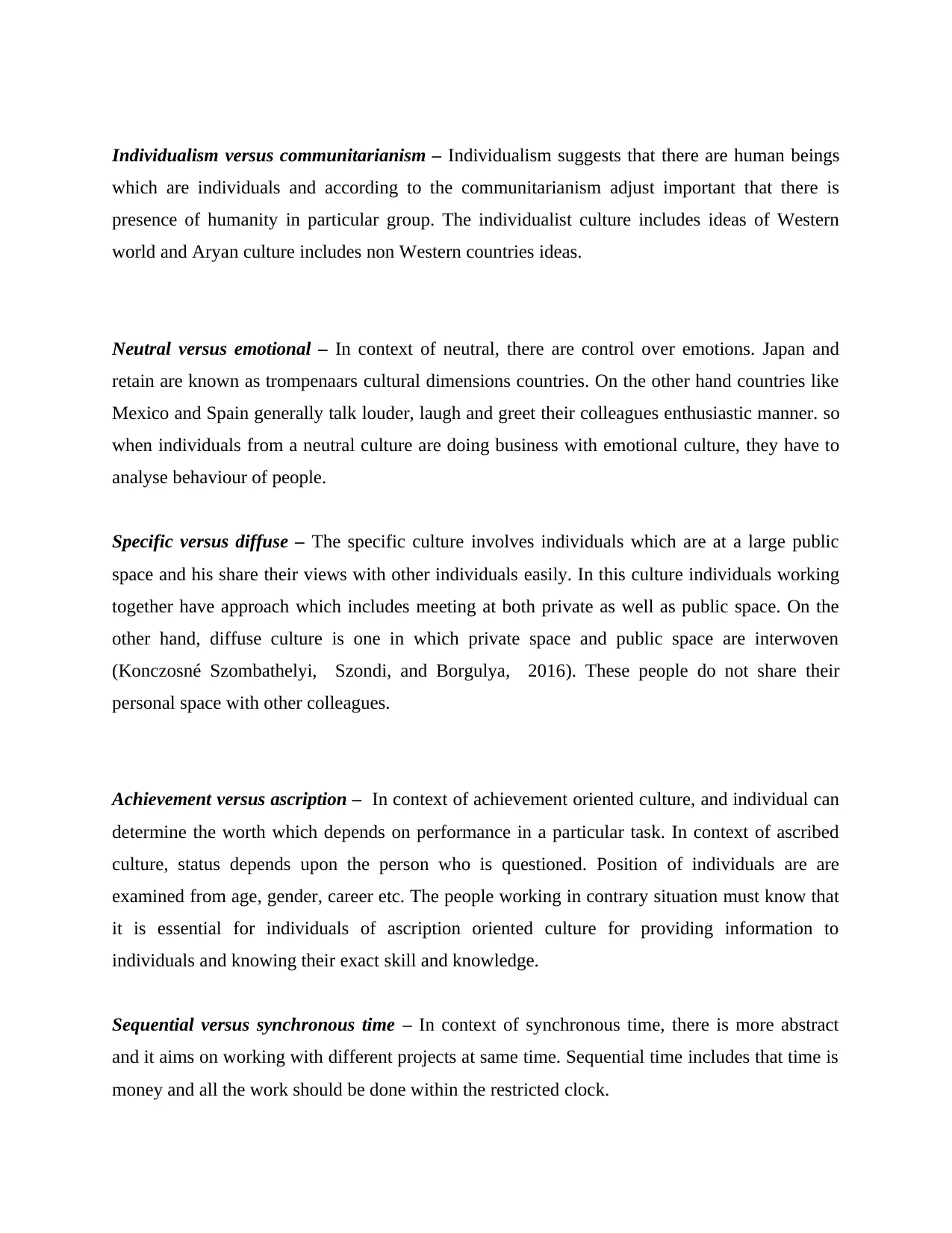
Individualism versus communitarianism – Individualism suggests that there are human beings
which are individuals and according to the communitarianism adjust important that there is
presence of humanity in particular group. The individualist culture includes ideas of Western
world and Aryan culture includes non Western countries ideas.
Neutral versus emotional – In context of neutral, there are control over emotions. Japan and
retain are known as trompenaars cultural dimensions countries. On the other hand countries like
Mexico and Spain generally talk louder, laugh and greet their colleagues enthusiastic manner. so
when individuals from a neutral culture are doing business with emotional culture, they have to
analyse behaviour of people.
Specific versus diffuse – The specific culture involves individuals which are at a large public
space and his share their views with other individuals easily. In this culture individuals working
together have approach which includes meeting at both private as well as public space. On the
other hand, diffuse culture is one in which private space and public space are interwoven
(Konczosné Szombathelyi, Szondi, and Borgulya, 2016). These people do not share their
personal space with other colleagues.
Achievement versus ascription – In context of achievement oriented culture, and individual can
determine the worth which depends on performance in a particular task. In context of ascribed
culture, status depends upon the person who is questioned. Position of individuals are are
examined from age, gender, career etc. The people working in contrary situation must know that
it is essential for individuals of ascription oriented culture for providing information to
individuals and knowing their exact skill and knowledge.
Sequential versus synchronous time – In context of synchronous time, there is more abstract
and it aims on working with different projects at same time. Sequential time includes that time is
money and all the work should be done within the restricted clock.
which are individuals and according to the communitarianism adjust important that there is
presence of humanity in particular group. The individualist culture includes ideas of Western
world and Aryan culture includes non Western countries ideas.
Neutral versus emotional – In context of neutral, there are control over emotions. Japan and
retain are known as trompenaars cultural dimensions countries. On the other hand countries like
Mexico and Spain generally talk louder, laugh and greet their colleagues enthusiastic manner. so
when individuals from a neutral culture are doing business with emotional culture, they have to
analyse behaviour of people.
Specific versus diffuse – The specific culture involves individuals which are at a large public
space and his share their views with other individuals easily. In this culture individuals working
together have approach which includes meeting at both private as well as public space. On the
other hand, diffuse culture is one in which private space and public space are interwoven
(Konczosné Szombathelyi, Szondi, and Borgulya, 2016). These people do not share their
personal space with other colleagues.
Achievement versus ascription – In context of achievement oriented culture, and individual can
determine the worth which depends on performance in a particular task. In context of ascribed
culture, status depends upon the person who is questioned. Position of individuals are are
examined from age, gender, career etc. The people working in contrary situation must know that
it is essential for individuals of ascription oriented culture for providing information to
individuals and knowing their exact skill and knowledge.
Sequential versus synchronous time – In context of synchronous time, there is more abstract
and it aims on working with different projects at same time. Sequential time includes that time is
money and all the work should be done within the restricted clock.
Paraphrase This Document
Need a fresh take? Get an instant paraphrase of this document with our AI Paraphraser
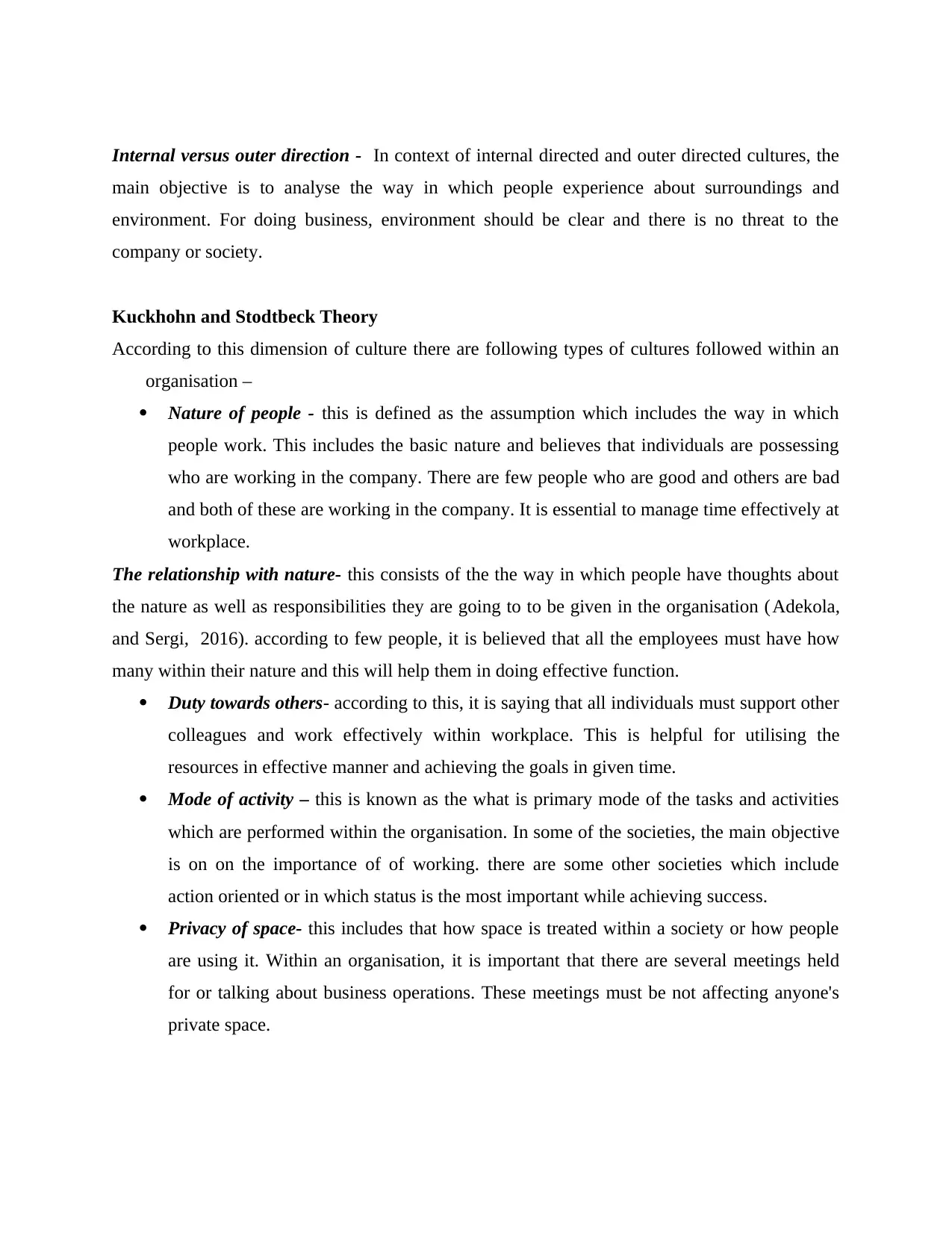
Internal versus outer direction - In context of internal directed and outer directed cultures, the
main objective is to analyse the way in which people experience about surroundings and
environment. For doing business, environment should be clear and there is no threat to the
company or society.
Kuckhohn and Stodtbeck Theory
According to this dimension of culture there are following types of cultures followed within an
organisation –
Nature of people - this is defined as the assumption which includes the way in which
people work. This includes the basic nature and believes that individuals are possessing
who are working in the company. There are few people who are good and others are bad
and both of these are working in the company. It is essential to manage time effectively at
workplace.
The relationship with nature- this consists of the the way in which people have thoughts about
the nature as well as responsibilities they are going to to be given in the organisation (Adekola,
and Sergi, 2016). according to few people, it is believed that all the employees must have how
many within their nature and this will help them in doing effective function.
Duty towards others- according to this, it is saying that all individuals must support other
colleagues and work effectively within workplace. This is helpful for utilising the
resources in effective manner and achieving the goals in given time.
Mode of activity – this is known as the what is primary mode of the tasks and activities
which are performed within the organisation. In some of the societies, the main objective
is on on the importance of of working. there are some other societies which include
action oriented or in which status is the most important while achieving success.
Privacy of space- this includes that how space is treated within a society or how people
are using it. Within an organisation, it is important that there are several meetings held
for or talking about business operations. These meetings must be not affecting anyone's
private space.
main objective is to analyse the way in which people experience about surroundings and
environment. For doing business, environment should be clear and there is no threat to the
company or society.
Kuckhohn and Stodtbeck Theory
According to this dimension of culture there are following types of cultures followed within an
organisation –
Nature of people - this is defined as the assumption which includes the way in which
people work. This includes the basic nature and believes that individuals are possessing
who are working in the company. There are few people who are good and others are bad
and both of these are working in the company. It is essential to manage time effectively at
workplace.
The relationship with nature- this consists of the the way in which people have thoughts about
the nature as well as responsibilities they are going to to be given in the organisation (Adekola,
and Sergi, 2016). according to few people, it is believed that all the employees must have how
many within their nature and this will help them in doing effective function.
Duty towards others- according to this, it is saying that all individuals must support other
colleagues and work effectively within workplace. This is helpful for utilising the
resources in effective manner and achieving the goals in given time.
Mode of activity – this is known as the what is primary mode of the tasks and activities
which are performed within the organisation. In some of the societies, the main objective
is on on the importance of of working. there are some other societies which include
action oriented or in which status is the most important while achieving success.
Privacy of space- this includes that how space is treated within a society or how people
are using it. Within an organisation, it is important that there are several meetings held
for or talking about business operations. These meetings must be not affecting anyone's
private space.
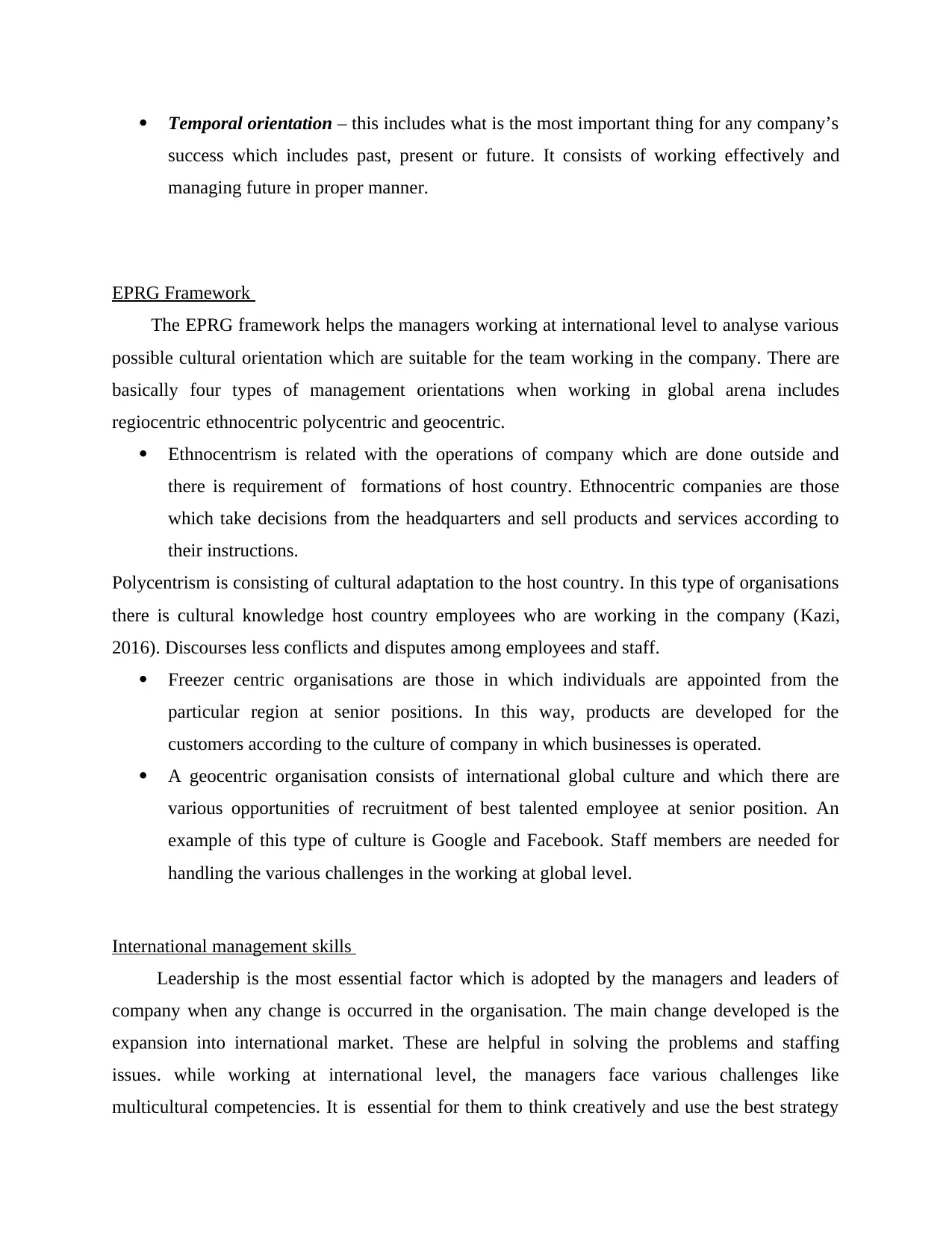
Temporal orientation – this includes what is the most important thing for any company’s
success which includes past, present or future. It consists of working effectively and
managing future in proper manner.
EPRG Framework
The EPRG framework helps the managers working at international level to analyse various
possible cultural orientation which are suitable for the team working in the company. There are
basically four types of management orientations when working in global arena includes
regiocentric ethnocentric polycentric and geocentric.
Ethnocentrism is related with the operations of company which are done outside and
there is requirement of formations of host country. Ethnocentric companies are those
which take decisions from the headquarters and sell products and services according to
their instructions.
Polycentrism is consisting of cultural adaptation to the host country. In this type of organisations
there is cultural knowledge host country employees who are working in the company (Kazi,
2016). Discourses less conflicts and disputes among employees and staff.
Freezer centric organisations are those in which individuals are appointed from the
particular region at senior positions. In this way, products are developed for the
customers according to the culture of company in which businesses is operated.
A geocentric organisation consists of international global culture and which there are
various opportunities of recruitment of best talented employee at senior position. An
example of this type of culture is Google and Facebook. Staff members are needed for
handling the various challenges in the working at global level.
International management skills
Leadership is the most essential factor which is adopted by the managers and leaders of
company when any change is occurred in the organisation. The main change developed is the
expansion into international market. These are helpful in solving the problems and staffing
issues. while working at international level, the managers face various challenges like
multicultural competencies. It is essential for them to think creatively and use the best strategy
success which includes past, present or future. It consists of working effectively and
managing future in proper manner.
EPRG Framework
The EPRG framework helps the managers working at international level to analyse various
possible cultural orientation which are suitable for the team working in the company. There are
basically four types of management orientations when working in global arena includes
regiocentric ethnocentric polycentric and geocentric.
Ethnocentrism is related with the operations of company which are done outside and
there is requirement of formations of host country. Ethnocentric companies are those
which take decisions from the headquarters and sell products and services according to
their instructions.
Polycentrism is consisting of cultural adaptation to the host country. In this type of organisations
there is cultural knowledge host country employees who are working in the company (Kazi,
2016). Discourses less conflicts and disputes among employees and staff.
Freezer centric organisations are those in which individuals are appointed from the
particular region at senior positions. In this way, products are developed for the
customers according to the culture of company in which businesses is operated.
A geocentric organisation consists of international global culture and which there are
various opportunities of recruitment of best talented employee at senior position. An
example of this type of culture is Google and Facebook. Staff members are needed for
handling the various challenges in the working at global level.
International management skills
Leadership is the most essential factor which is adopted by the managers and leaders of
company when any change is occurred in the organisation. The main change developed is the
expansion into international market. These are helpful in solving the problems and staffing
issues. while working at international level, the managers face various challenges like
multicultural competencies. It is essential for them to think creatively and use the best strategy
⊘ This is a preview!⊘
Do you want full access?
Subscribe today to unlock all pages.

Trusted by 1+ million students worldwide
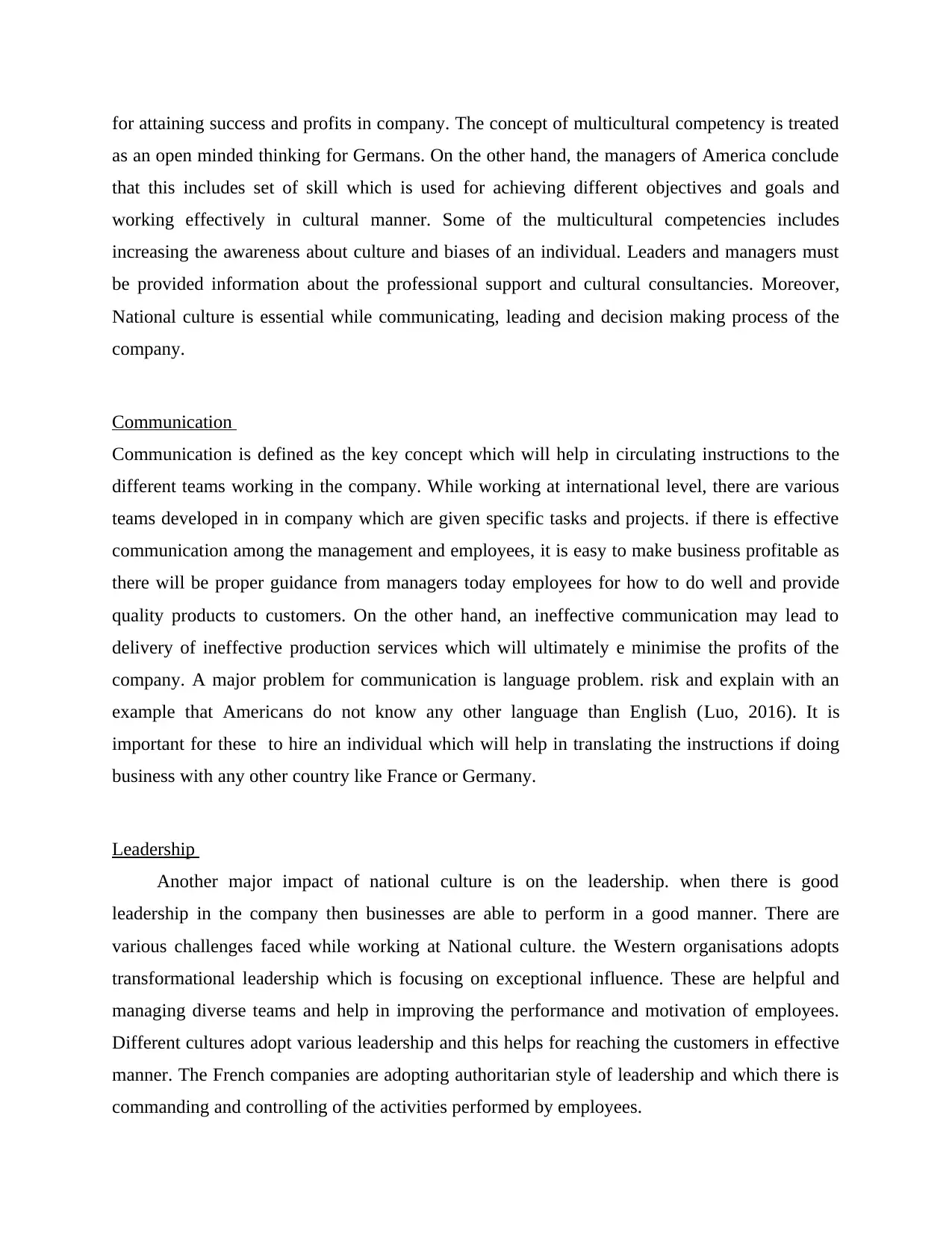
for attaining success and profits in company. The concept of multicultural competency is treated
as an open minded thinking for Germans. On the other hand, the managers of America conclude
that this includes set of skill which is used for achieving different objectives and goals and
working effectively in cultural manner. Some of the multicultural competencies includes
increasing the awareness about culture and biases of an individual. Leaders and managers must
be provided information about the professional support and cultural consultancies. Moreover,
National culture is essential while communicating, leading and decision making process of the
company.
Communication
Communication is defined as the key concept which will help in circulating instructions to the
different teams working in the company. While working at international level, there are various
teams developed in in company which are given specific tasks and projects. if there is effective
communication among the management and employees, it is easy to make business profitable as
there will be proper guidance from managers today employees for how to do well and provide
quality products to customers. On the other hand, an ineffective communication may lead to
delivery of ineffective production services which will ultimately e minimise the profits of the
company. A major problem for communication is language problem. risk and explain with an
example that Americans do not know any other language than English (Luo, 2016). It is
important for these to hire an individual which will help in translating the instructions if doing
business with any other country like France or Germany.
Leadership
Another major impact of national culture is on the leadership. when there is good
leadership in the company then businesses are able to perform in a good manner. There are
various challenges faced while working at National culture. the Western organisations adopts
transformational leadership which is focusing on exceptional influence. These are helpful and
managing diverse teams and help in improving the performance and motivation of employees.
Different cultures adopt various leadership and this helps for reaching the customers in effective
manner. The French companies are adopting authoritarian style of leadership and which there is
commanding and controlling of the activities performed by employees.
as an open minded thinking for Germans. On the other hand, the managers of America conclude
that this includes set of skill which is used for achieving different objectives and goals and
working effectively in cultural manner. Some of the multicultural competencies includes
increasing the awareness about culture and biases of an individual. Leaders and managers must
be provided information about the professional support and cultural consultancies. Moreover,
National culture is essential while communicating, leading and decision making process of the
company.
Communication
Communication is defined as the key concept which will help in circulating instructions to the
different teams working in the company. While working at international level, there are various
teams developed in in company which are given specific tasks and projects. if there is effective
communication among the management and employees, it is easy to make business profitable as
there will be proper guidance from managers today employees for how to do well and provide
quality products to customers. On the other hand, an ineffective communication may lead to
delivery of ineffective production services which will ultimately e minimise the profits of the
company. A major problem for communication is language problem. risk and explain with an
example that Americans do not know any other language than English (Luo, 2016). It is
important for these to hire an individual which will help in translating the instructions if doing
business with any other country like France or Germany.
Leadership
Another major impact of national culture is on the leadership. when there is good
leadership in the company then businesses are able to perform in a good manner. There are
various challenges faced while working at National culture. the Western organisations adopts
transformational leadership which is focusing on exceptional influence. These are helpful and
managing diverse teams and help in improving the performance and motivation of employees.
Different cultures adopt various leadership and this helps for reaching the customers in effective
manner. The French companies are adopting authoritarian style of leadership and which there is
commanding and controlling of the activities performed by employees.
Paraphrase This Document
Need a fresh take? Get an instant paraphrase of this document with our AI Paraphraser
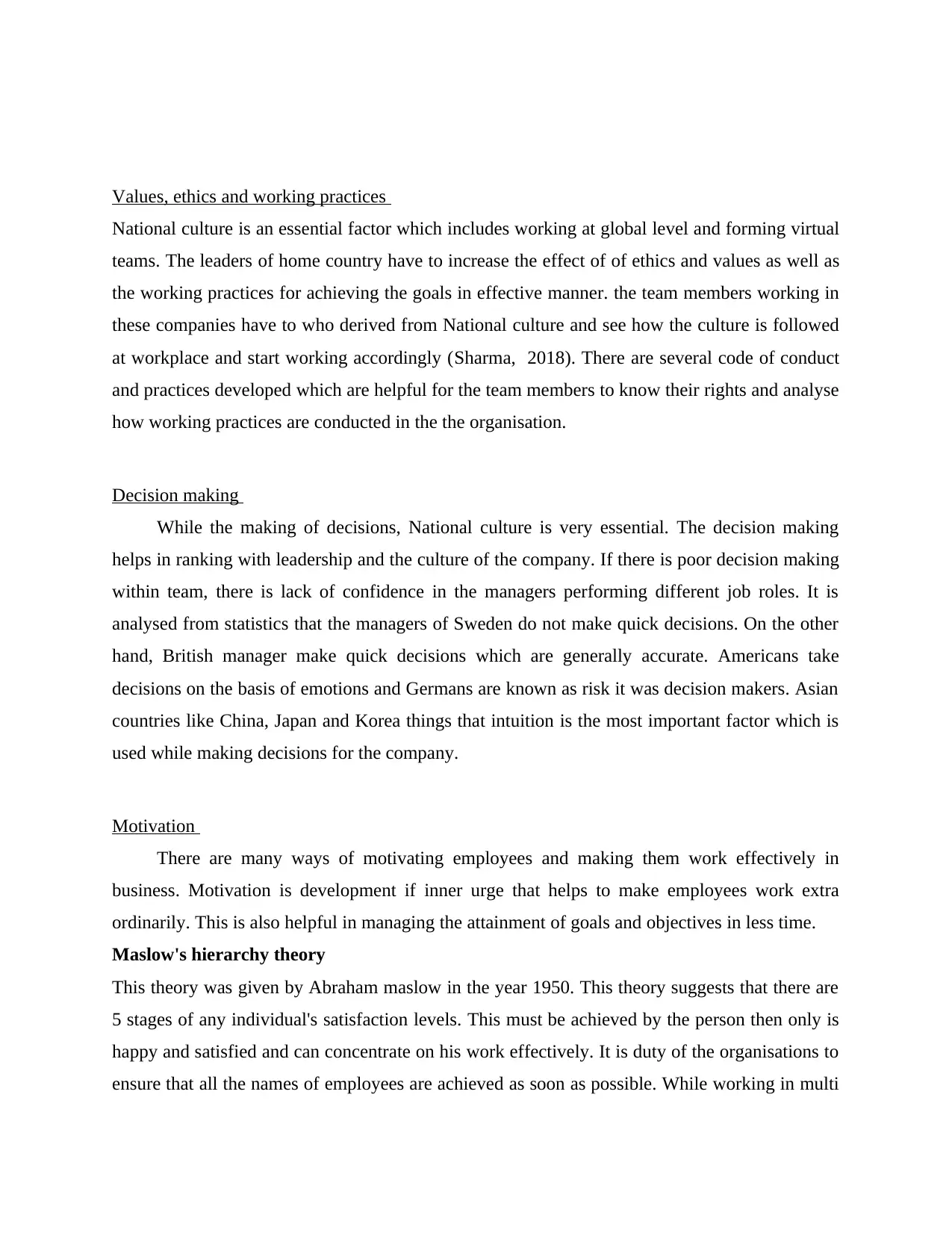
Values, ethics and working practices
National culture is an essential factor which includes working at global level and forming virtual
teams. The leaders of home country have to increase the effect of of ethics and values as well as
the working practices for achieving the goals in effective manner. the team members working in
these companies have to who derived from National culture and see how the culture is followed
at workplace and start working accordingly (Sharma, 2018). There are several code of conduct
and practices developed which are helpful for the team members to know their rights and analyse
how working practices are conducted in the the organisation.
Decision making
While the making of decisions, National culture is very essential. The decision making
helps in ranking with leadership and the culture of the company. If there is poor decision making
within team, there is lack of confidence in the managers performing different job roles. It is
analysed from statistics that the managers of Sweden do not make quick decisions. On the other
hand, British manager make quick decisions which are generally accurate. Americans take
decisions on the basis of emotions and Germans are known as risk it was decision makers. Asian
countries like China, Japan and Korea things that intuition is the most important factor which is
used while making decisions for the company.
Motivation
There are many ways of motivating employees and making them work effectively in
business. Motivation is development if inner urge that helps to make employees work extra
ordinarily. This is also helpful in managing the attainment of goals and objectives in less time.
Maslow's hierarchy theory
This theory was given by Abraham maslow in the year 1950. This theory suggests that there are
5 stages of any individual's satisfaction levels. This must be achieved by the person then only is
happy and satisfied and can concentrate on his work effectively. It is duty of the organisations to
ensure that all the names of employees are achieved as soon as possible. While working in multi
National culture is an essential factor which includes working at global level and forming virtual
teams. The leaders of home country have to increase the effect of of ethics and values as well as
the working practices for achieving the goals in effective manner. the team members working in
these companies have to who derived from National culture and see how the culture is followed
at workplace and start working accordingly (Sharma, 2018). There are several code of conduct
and practices developed which are helpful for the team members to know their rights and analyse
how working practices are conducted in the the organisation.
Decision making
While the making of decisions, National culture is very essential. The decision making
helps in ranking with leadership and the culture of the company. If there is poor decision making
within team, there is lack of confidence in the managers performing different job roles. It is
analysed from statistics that the managers of Sweden do not make quick decisions. On the other
hand, British manager make quick decisions which are generally accurate. Americans take
decisions on the basis of emotions and Germans are known as risk it was decision makers. Asian
countries like China, Japan and Korea things that intuition is the most important factor which is
used while making decisions for the company.
Motivation
There are many ways of motivating employees and making them work effectively in
business. Motivation is development if inner urge that helps to make employees work extra
ordinarily. This is also helpful in managing the attainment of goals and objectives in less time.
Maslow's hierarchy theory
This theory was given by Abraham maslow in the year 1950. This theory suggests that there are
5 stages of any individual's satisfaction levels. This must be achieved by the person then only is
happy and satisfied and can concentrate on his work effectively. It is duty of the organisations to
ensure that all the names of employees are achieved as soon as possible. While working in multi
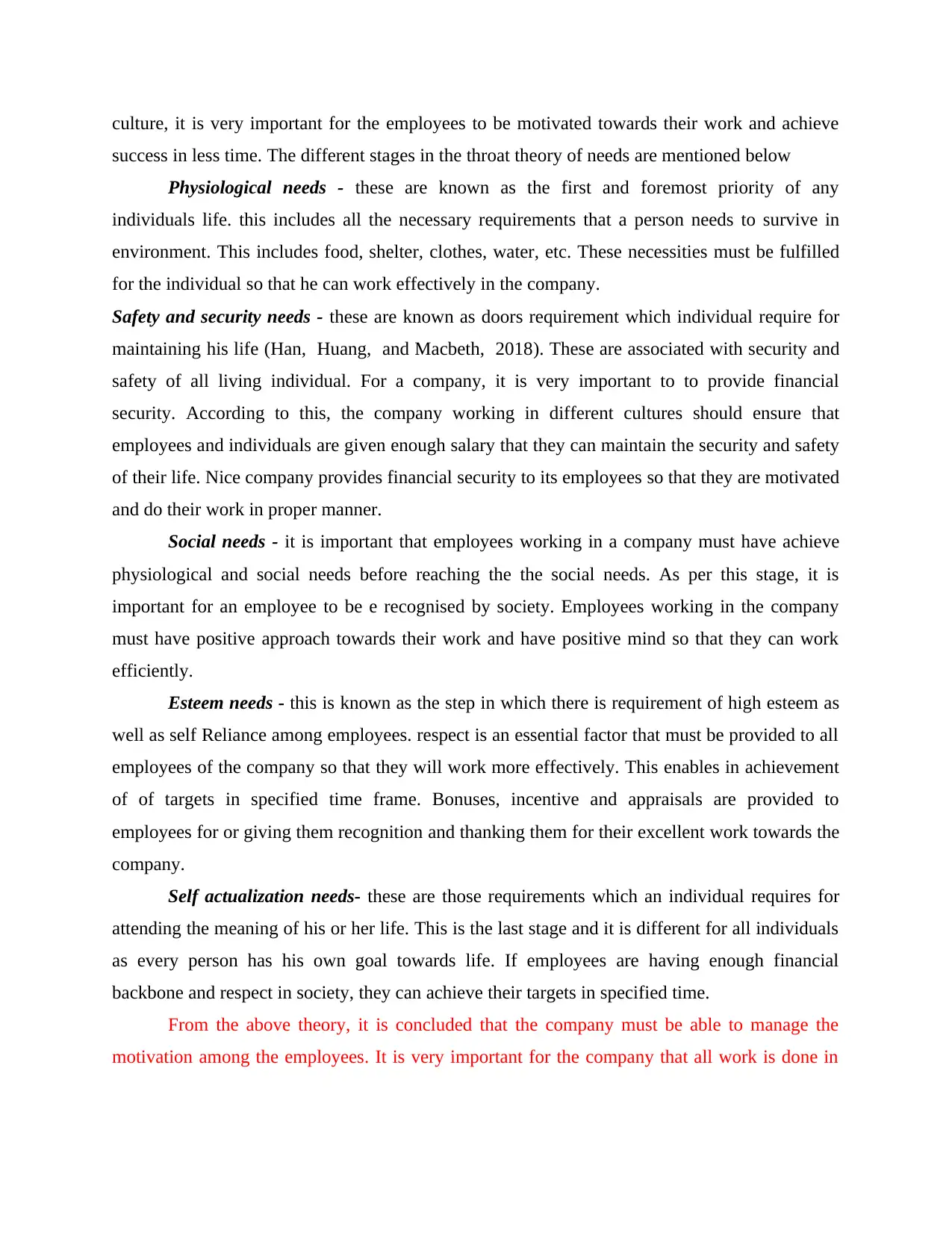
culture, it is very important for the employees to be motivated towards their work and achieve
success in less time. The different stages in the throat theory of needs are mentioned below
Physiological needs - these are known as the first and foremost priority of any
individuals life. this includes all the necessary requirements that a person needs to survive in
environment. This includes food, shelter, clothes, water, etc. These necessities must be fulfilled
for the individual so that he can work effectively in the company.
Safety and security needs - these are known as doors requirement which individual require for
maintaining his life (Han, Huang, and Macbeth, 2018). These are associated with security and
safety of all living individual. For a company, it is very important to to provide financial
security. According to this, the company working in different cultures should ensure that
employees and individuals are given enough salary that they can maintain the security and safety
of their life. Nice company provides financial security to its employees so that they are motivated
and do their work in proper manner.
Social needs - it is important that employees working in a company must have achieve
physiological and social needs before reaching the the social needs. As per this stage, it is
important for an employee to be e recognised by society. Employees working in the company
must have positive approach towards their work and have positive mind so that they can work
efficiently.
Esteem needs - this is known as the step in which there is requirement of high esteem as
well as self Reliance among employees. respect is an essential factor that must be provided to all
employees of the company so that they will work more effectively. This enables in achievement
of of targets in specified time frame. Bonuses, incentive and appraisals are provided to
employees for or giving them recognition and thanking them for their excellent work towards the
company.
Self actualization needs- these are those requirements which an individual requires for
attending the meaning of his or her life. This is the last stage and it is different for all individuals
as every person has his own goal towards life. If employees are having enough financial
backbone and respect in society, they can achieve their targets in specified time.
From the above theory, it is concluded that the company must be able to manage the
motivation among the employees. It is very important for the company that all work is done in
success in less time. The different stages in the throat theory of needs are mentioned below
Physiological needs - these are known as the first and foremost priority of any
individuals life. this includes all the necessary requirements that a person needs to survive in
environment. This includes food, shelter, clothes, water, etc. These necessities must be fulfilled
for the individual so that he can work effectively in the company.
Safety and security needs - these are known as doors requirement which individual require for
maintaining his life (Han, Huang, and Macbeth, 2018). These are associated with security and
safety of all living individual. For a company, it is very important to to provide financial
security. According to this, the company working in different cultures should ensure that
employees and individuals are given enough salary that they can maintain the security and safety
of their life. Nice company provides financial security to its employees so that they are motivated
and do their work in proper manner.
Social needs - it is important that employees working in a company must have achieve
physiological and social needs before reaching the the social needs. As per this stage, it is
important for an employee to be e recognised by society. Employees working in the company
must have positive approach towards their work and have positive mind so that they can work
efficiently.
Esteem needs - this is known as the step in which there is requirement of high esteem as
well as self Reliance among employees. respect is an essential factor that must be provided to all
employees of the company so that they will work more effectively. This enables in achievement
of of targets in specified time frame. Bonuses, incentive and appraisals are provided to
employees for or giving them recognition and thanking them for their excellent work towards the
company.
Self actualization needs- these are those requirements which an individual requires for
attending the meaning of his or her life. This is the last stage and it is different for all individuals
as every person has his own goal towards life. If employees are having enough financial
backbone and respect in society, they can achieve their targets in specified time.
From the above theory, it is concluded that the company must be able to manage the
motivation among the employees. It is very important for the company that all work is done in
⊘ This is a preview!⊘
Do you want full access?
Subscribe today to unlock all pages.

Trusted by 1+ million students worldwide
1 out of 16
Related Documents
Your All-in-One AI-Powered Toolkit for Academic Success.
+13062052269
info@desklib.com
Available 24*7 on WhatsApp / Email
![[object Object]](/_next/static/media/star-bottom.7253800d.svg)
Unlock your academic potential
Copyright © 2020–2025 A2Z Services. All Rights Reserved. Developed and managed by ZUCOL.





